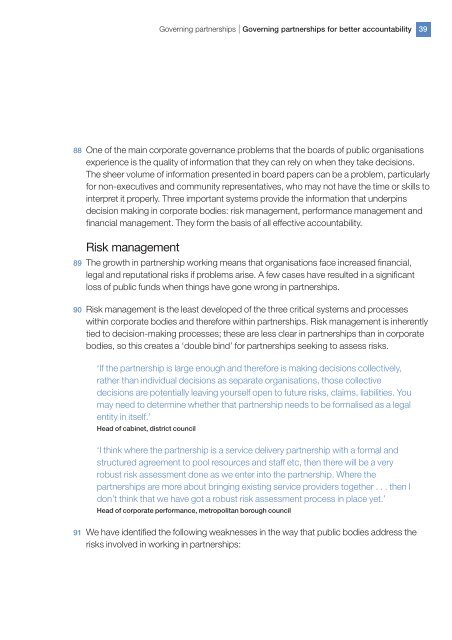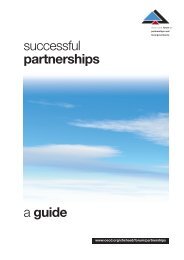Bridging the accountability gap - Audit Commission
Bridging the accountability gap - Audit Commission
Bridging the accountability gap - Audit Commission
Create successful ePaper yourself
Turn your PDF publications into a flip-book with our unique Google optimized e-Paper software.
Governing partnerships | Governing partnerships for better <strong>accountability</strong> 39<br />
88 One of <strong>the</strong> main corporate governance problems that <strong>the</strong> boards of public organisations<br />
experience is <strong>the</strong> quality of information that <strong>the</strong>y can rely on when <strong>the</strong>y take decisions.<br />
The sheer volume of information presented in board papers can be a problem, particularly<br />
for non-executives and community representatives, who may not have <strong>the</strong> time or skills to<br />
interpret it properly. Three important systems provide <strong>the</strong> information that underpins<br />
decision making in corporate bodies: risk management, performance management and<br />
financial management. They form <strong>the</strong> basis of all effective <strong>accountability</strong>.<br />
Risk management<br />
89 The growth in partnership working means that organisations face increased financial,<br />
legal and reputational risks if problems arise. A few cases have resulted in a significant<br />
loss of public funds when things have gone wrong in partnerships.<br />
90 Risk management is <strong>the</strong> least developed of <strong>the</strong> three critical systems and processes<br />
within corporate bodies and <strong>the</strong>refore within partnerships. Risk management is inherently<br />
tied to decision-making processes; <strong>the</strong>se are less clear in partnerships than in corporate<br />
bodies, so this creates a ‘double bind’ for partnerships seeking to assess risks.<br />
‘If <strong>the</strong> partnership is large enough and <strong>the</strong>refore is making decisions collectively,<br />
ra<strong>the</strong>r than individual decisions as separate organisations, those collective<br />
decisions are potentially leaving yourself open to future risks, claims, liabilities. You<br />
may need to determine whe<strong>the</strong>r that partnership needs to be formalised as a legal<br />
entity in itself.’<br />
Head of cabinet, district council<br />
‘I think where <strong>the</strong> partnership is a service delivery partnership with a formal and<br />
structured agreement to pool resources and staff etc, <strong>the</strong>n <strong>the</strong>re will be a very<br />
robust risk assessment done as we enter into <strong>the</strong> partnership. Where <strong>the</strong><br />
partnerships are more about bringing existing service providers toge<strong>the</strong>r . . . <strong>the</strong>n I<br />
don’t think that we have got a robust risk assessment process in place yet.’<br />
Head of corporate performance, metropolitan borough council<br />
91 We have identified <strong>the</strong> following weaknesses in <strong>the</strong> way that public bodies address <strong>the</strong><br />
risks involved in working in partnerships:








